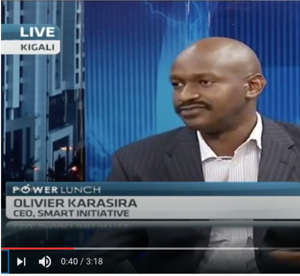
After last week’s FHIR DevDays conference, I blogged on Wednesday that Morgan Gleason had won the judges’ award in the Patient Innovator Track. There was another winner – for the first time we did a People’s Choice award, and it was won by Olivier Karasira, a man in Rwanda working on a remarkable project: “Turning Paper into FHIR in Africa.”
His was an unusual submission: a professionally produced video, and unlike the others, it’s not about an individual working on their own health with their own data; it’s about a substantial initiative to help families with their children’s health, by digitizing paper records. Importantly, the resulting digitized health information isn’t given to doctors – it’s given directly to the family, to be stored in their smartphone and used however they like.

Tech-minded readers will be interested to know that the data is encoded using SNOMED-CT (tutorial, Wikipedia) and stored as FHIR resources. In a nutshell, SNOMED is a standard (a universal vocabulary) for encoding a wide variety of health-related concepts in ways computers can understand – drugs, diseases, parts of the body, etc. – and FHIR is a way of moving it around. (Thanks to FHIR guru Lloyd Mackenzie for that explanation.) So, it’s a real boon to these families that the project is taking kids’ paper health history and turning it right into movable electronic form under their own control.
The motivation is inspiring
As you’ll see in the video, this project didn’t start in healthcare: it started from a desire to help kids do better in school(!), through Olivier’s project called Smart Initiative. They soon found that doing well in school requires good health, which led to realizing it’s hard to manage health (or anything) when the information is on paper and can’t be shared with professionals.
They were already working on SNOMED. Then serendipitously, just before our Patient Track was announced, they discovered a not-really-announced-yet startup, The Sovereignty Network, which is entirely based on FHIR, so FHIR became part of the project (and they submitted their DevDays entry and were chosen a finalist). Sovereignty Network believes patient data should be owned by the patient (the sovereignty concept is about full independence) so they’re developing software and a business model to support it. Olivier quickly got set up with them and is using them.
As in Morgan’s case, a robust discussion about Olivier’s presentation quickly started on the FHIR public chat board.
See, this is what happens when people start connecting through open standards that anyone can use, in an open community! It’s what patient data activists have hungered for, for years, and it’s happening.
Thanks to the DevDays community for naming this their favorite project, and congratulations to Olivier for the recognition!
Would you like to co-sponsor the next Patient Innovation Track?
We in the FHIR DevDays project are looking ahead to the next conference, tentatively set for this Fall, and we’re looking for sponsors to support the track (with appropriate publicity for their support). Last fall it was the Dutch Ministry of Health; this time it was an anonymous benefactor. If your company or foundation would like to support the cause, please email the organizers.


Leave a Reply